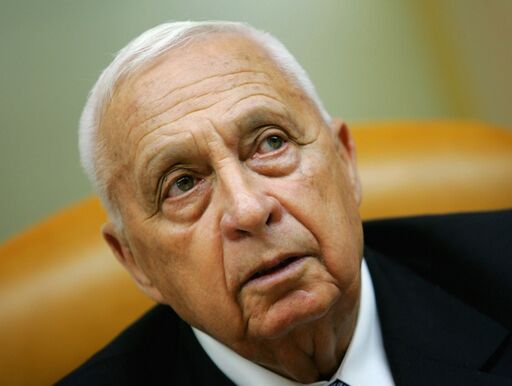
Ariel Sharon Moves Boldly Into Danger
Israeli Prime Minister Ariel Sharon’s maneuvering to gain control over final-status negotiations with the Palestinians is in full swing. In a move to circumvent conservatives in Likud—the political party he helped to found in 1973—who are opposed to accelerating the peace process, Sharon last week announced that he would leave the party.
The Likud Party formed when three parties merged; the acronym Likud means unity in Hebrew. As of late, the party has been the antithesis of unity. Sharon, sharply criticized for his plan to pull out of the Gaza Strip, suffered through repeated votes of confidence and a challenge to his leadership by former prime minister and Likud finance minister Benjamin Netanyahu. All were eager to stultify Sharon’s peace agenda.
“The break separating right from right, Mr. Sharon’s chief strategist says, is the result of what might be summarized as the inevitable split between pragmatists and purists” (Christian Science Monitor, November 25).
Tired of the opposition within the ranks, he turned the tables by dropping a political atom bomb. His decision to form a new party scattered the fragmented Likud into two camps: centrists and hardliners—with centrists flocking to Sharon’s side and hardliners struggling to fathom this new political reality.
And this political reality is compromise.
“While the purists are holding fast to their dreams of having a ‘Greater Israel’ that includes the West Bank and Gaza, the pragmatists—many of whom are joining Sharon—have come to view a Palestinian state in those territories as an inescapable conclusion” (ibid.).
Sharon made the move to blunt the hardliners’ swords in opposing the peace arrangements he is molding with the center-left doves. In doing so, he decimated their party, shattering its power as a leading voice in the Knesset. The move also cleared the way for his left-leaning brotherhood in arms, the Labor Party, to forge an alliance with his new party.
In this bold political step, essentially Sharon signaled his commitment to clear the path for moderates to secure a final political framework with the Palestinians.
Sharon named his new party Kadima, meaning forward. His agenda, smelted by years of political heat and his own burning desire for a pragmatic solution to the Palestinian question, is set to capitalize on his embattled people’s yearning to go forward toward peace in their lifetime. By forging a new party and eliminating the opposition, Ariel Sharon positioned himself to be Israel’s provider. He wants to be the man who brings peace to his people.
Israel has had to fight to exist since the day of its birth. Generations of Israelis have aged and died in the shadow of violence, terrorism and war. Most are resigned to the deadening sense that their children’s lives will be plagued with more violence than their own. They want—they hope, with a hope ground thin and hollow—to live in peace.
Oh, how an Israeli prime minister would love to give it to them.
This pressure brought Yitzhak Rabin to shake hands with Yasser Arafat despite giving his word he’d never negotiate with the Palestinian Liberation Organization. This pressure convinced Benjamin Netanyahu to cede the Golan Heights to Syria, a plan that, if enacted, would have smashed one of his own campaign promises. This pressure coerced Ehud Barak to offer much of eastern Jerusalem to the Palestinian Authority after vowing to keep the city united under Jewish rule forever (New York Sun, June 29, 2004).
Looking at the climate in which Israel’s leader must govern, it’s easy to see why the men in that office have tended to take such risks. But that doesn’t change the reality that these risks have never paid off, producing only more violence and making the promise of peace that much more elusive.
Nevertheless, it appears the Israeli public is ready to follow Sharon where he is preparing to travel. According to a poll by one of Israel’s leading newspapers, Yedioth Ahronoth, if elections were held now Kadima would win 33 Knesset seats, the Labor Party 26 seats, and the beleaguered Likud a paltry 13. Foregoing some seismic shift to the right by the general populace, it appears that the March 2006 election will bring Sharon’s center-left designs to full fruition.
For Sharon, who is 77, this is his last voyage into the murky waters of peace deals. “[Sharon] doesn’t need to run again,” says Ethan Dor-Shav, a political analyst and associate fellow at Jerusalem’s Shalem Center, “and it’s going to be stated quite clearly that this will be a last time for him, and that he will reach a final-status agreement with the Palestinian Authority, one that will determine borders, within the next four years” (Christian Science Monitor, November 22).
Here is the unhappy truth of the matter, according to Bible prophecy: Any sacrifices the prime minister makes will prove only to strengthen his enemies and weaken his country.
Prime Minister Sharon has promised not to give up the larger settlements in the West Bank or Jerusalem. But his backpedal on the Gaza settlements belies such pledges.
In fact, the history of Israeli politics since the start of the misnamed peace process is strewn with instances of Israel’s leaders going back on promises in desperate hopes of achieving a state of peace.
This is a pivotal moment for Israel. The more impatient Sharon gets—the more eager to make his mark on history—the more devastating it will be for the Jewish state.
These events are worthy of our closest scrutiny. They presage the fulfillment of a biblical prophecy the Trumpet has informed its readers of for a decade—a prophecy of Israel becoming so desperate for an end to its woes that it runs for salvation into the arms of its greatest enemy.
